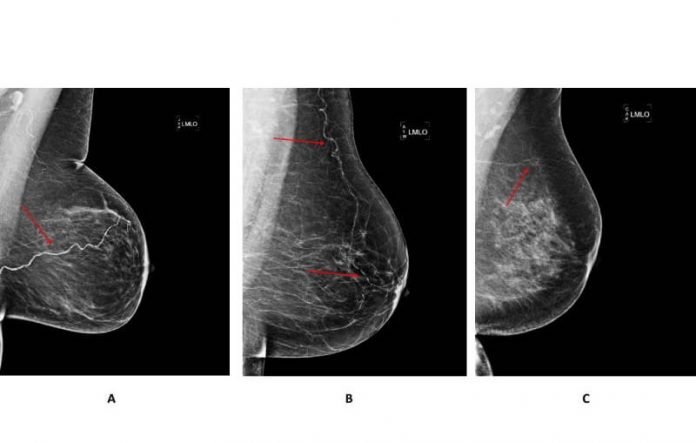
In a new study from Kaiser Permanente, researchers found routine mammograms used to screen for breast cancer also could help identify postmenopausal women at higher risk for heart attacks or strokes.
Researchers found that breast arterial calcification, which commonly appears as white spots on breast images and indicates a buildup of calcium in the arteries, is associated with an increased risk for developing cardiovascular disease.
Breast arterial calcification can occur as women age and is related to Type 2 diabetes, high blood pressure and inflammation.
It is a marker for stiffening arteries but is not the same type of calcification found in the inner layer of the arteries that is caused by smoking or high cholesterol levels.
The appearance of calcification during breast imaging may be overlooked because it isn’t believed to signal the presence of breast cancer.
In the study, the team analyzed health records for 5,059 postmenopausal women who had digital mammogram screening at nine centers in northern California between October 2012 and February 2015.
The women, ages 60-79, were followed for 6 1/2 years after their screenings to see if they had a heart attack, stroke or any other type of cardiovascular disease.
Women who showed evidence of calcification were 51% more likely to develop heart disease or have a stroke than those who showed no calcification in the arteries of their breasts.
They were 23% more likely to develop any type of cardiovascular disease, which included heart failure and peripheral artery disease.
Calcification was more prevalent among women who identified themselves as white or Hispanic and less common among those who self-identified as Black or Asian.
Considering cardiovascular disease is the leading cause of death for women, the researchers said their findings suggest mammograms could be another useful tool for the early identification and prevention of heart disease in women.
The American Cancer Society recommends mammograms every year for women 45-54, with the option to switch to every two years for women 55 and older.
The team says doctors can use the opportunity to discuss ways to optimize heart health, such as engaging in routine physical activity, high-quality diet and maintaining a healthy weight.
If you care about heart health, please read studies about COVID-19 linked to heart injury, worse health in people with heart disease, and this simple blood test could help reduce heart disease deaths.
For more information about heart disease, please see recent studies about how to keep a healthy heart during COVID-19, and results showing that common kidney problems linked to high heart failure risk.
The study is published in Circulation: Cardiovascular Imaging and was conducted by Dr. Carlos Iribarren et al.
Copyright © 2022 Knowridge Science Report. All rights reserved.



